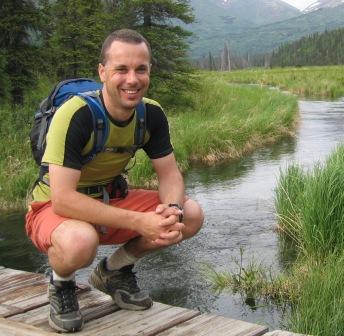"We need the possibility of escape as surely as we need hope."
- Edward Abbey
 |
| Everywhere we went, Arctic and Aleutian Terns enthralled us with their beauty... (Click picture to enlarge) |
 |
| I love anything that eats their weight in bugs each day! |
Our journey starts at Anigaaq – a small ranger cabin on the
coastal edge of Cape Krusenstern National Monument. We are here to work with
the Native Village of Kotzebue and National Park Service to better understand
how coastal lagoons work – and most importantly the importance of food security
for the fish themselves, their predators, and the local villagers who rely on
whitefish, salmon, and sheefish for their own sustenance.
 |
| Anigaaq ranger cabin and outhouse with a view |
Krusenstern lagoon is bordered by an amazing wetland filled with
trumpeter swans, sand hill cranes, and a myriad of other waterbirds, waders, and
shorebirds. It’s a National Park Unit that is remote enough to preclude
visitation by most, but is a wonder of life, history, and beauty.
 |
| The 1.5 hour daily commute up the Anigaaq channel to get to Krusenstern Lagoon |
After a few days at Krusenstern, we move about 40 miles north by small boat to work at Kotlik Lagoon. The
gentle roar of the outflowing tide meeting the sea in a line of breaking waves
is constant at our small camp. The narrow entrance to Kotlik Lagoon is lined with gravel and
bordered with tundra filled with purple,magenta and yellow flowers. I was told to never forget to look at those flowers - often diminutive compared to the charismatic wildlife, but always beautiful.
 |
| Our Camp at Kotlik Lagoon (Click picture to enlarge) |
Starry flounder and saffron cod stir the shallows, probably
eating the same mysids as the Arctic terns that casually leave their small
colony and flit back and forth over the entrance, delicately stooping to the
water to feed.
A seal, probably bearded, visited last night and this morning a cow and calf grey whale loll in the shallows for a few hours – only 10 meters from shore. They roll over and over and spy hop constantly. Another adult follows an hour later, but leaves as well. Then it's just the black-legged kittiwakes, mew gulls and terns that feed in the shallows and tide rips of our camp on the edge of Alaska.
Parasitic and Pomarine jaegers sit casually around,
lifting off periodically to harass a gull or tern until it drops their hard-won food to the
ground. They then land and swallow the morsel in one smooth and almost instantaneous
motion.
A seal, probably bearded, visited last night and this morning a cow and calf grey whale loll in the shallows for a few hours – only 10 meters from shore. They roll over and over and spy hop constantly. Another adult follows an hour later, but leaves as well. Then it's just the black-legged kittiwakes, mew gulls and terns that feed in the shallows and tide rips of our camp on the edge of Alaska.
 |
| A young gray whale surfaces for a look... |
 |
| Pomarine Jaeger cruising the shoreline looking for trouble to make... |
 |
| Musk oxen do nothing fast - this thinking moment went on for 5 hours |
A couple of young bears had passed through yesterday, evidenced by their tracks, but we saw them later in the day moving away from camp. A pair of musk oxen sidle slowly to the end of the beach and then went to sleep to ponder their next moves. Sleeping in the edge of the term colony causes a ruckus; the terns scream their “Kack Kack!” and go sit nearby staring at the neanderthal looking goat relatives in the hopes they would leave – that didn’t happen for another two days!
Black Turnstones and semi-palmated plovers dither along
the water’s edge and a Pacific loon plaintively calls from just offshore.
A few pairs of eiders or a small flock of scoters fly past once in a
while.
 |
| When it's not the bugs, it's the bears! |
"Has joy any survival value in the operations of evolution? I suspect that it does; I suspect that the morose and fearful are doomed to quick extinction. Where there is no joy there can be no courage; and without courage all other virtues are useless."
- Edward Abbey
 |
| Heading home in the trusty 185 on floats |





No comments:
Post a Comment